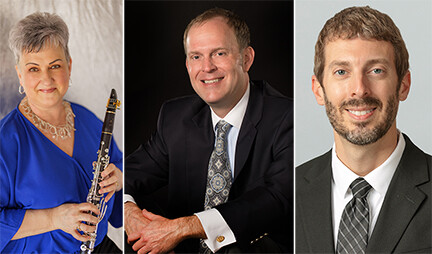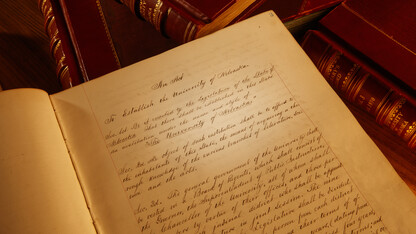
The Glenn Korff School of Music’s Diane Barger (clarinet), Mark Clinton (piano) and Nathan Koch (bassoon) will present “Bookends,” a faculty recital, at 7:30 p.m. Jan. 26 in Westbrook Recital Hall, Room 119.
The recital is free and open to the public. The concert will also be live webcast.
“Audiences can expect a program of beautiful, exciting music written for a great combination of instruments that is not often heard in concert,” Koch said.
The program includes William Yeats Hurlstone’s “Variations in G minor” (edited by Bruce Gbur); Michael Glinka’s “Trio Pathétique in D minor” and Hurlstone’s “Trio in G minor.”
“Variations in G minor” was composed in 1894 just weeks after Hurlstone’s 18th birthday and before he entered the Royal College of Music.
“The theme was used again just two years later in his ‘Variations for Orchestra on an Original Theme,’” Koch said. “The piece showcases the composer’s inventiveness, taking the listener through nine unique variations, even employing an unconventional ‘lopsided’ 5/8 time signature.”
Glinka’s “Trio” was written in 1832 near the end of his studies in Italy.
“This piece is unique for his compositional output at the time in that the majority are vocal works, yet one can hear echoes of vocal lyricism and operatic bel canto style in the instrumental writing,” Koch said. “Even though he developed a great fondness for the Italian tradition and admired the operatic greats Bellini and Donizetti, Glinka grew homesick for his home country of Russia, and this feeling ultimately led him to develop a new, more ‘Russian’ nationalistic style of composing. This style inspired Russian composers in the mid-19th century (such as Rimsky-Korsakov and Mussorgsky) to expand on this philosophy, further codifying the Russian sound and champion works by Russian composers.”
Hurlstone’s “Trio in G minor” was composed around 1896-1897, and Koch said it may not have been performed during the composer’s lifetime.
“The first publication of this work included only three movements, however, in recent years, a fourth movement (a ‘Scherzo’) was discovered in a collection of manuscripts and is believed by some scholars to be a part of this piece,” Koch said. “We’ll be playing this piece with all four movements, and the audience can decide for themselves whether or not they feel it belongs.”
Barger is the Ron and Carol Cope professor of music in the Glenn Korff School of Music and a member of the resident faculty Moran Quintet and the Amicitia Duo. She is principal clarinet of Lincoln’s Symphony Orchestra and president of the International Clarinet Association. She remains an active soloist and chamber musician, masterclass clinician and adjudicator throughout the U.S. and abroad. Learn more about Barger here.
Clinton is Hixson-Lied Professor of piano and area head for keyboard in the Glenn Korff School of Music. This critically acclaimed pianist has garnered prizes at such prestigious international competitions as the 1987 William Kapell International Piano Competition and the 1991 Joanna Hodges Piano Competition. He has been featured frequently on national radio and television broadcasts, including National Public Radio’s Performance Today. Learn more about Clinton here.
Koch is assistant professor of bassoon and music theory in the Glenn Korff School of Music and a member of the Moran Quintet. In demand as a clinician and soloist, Koch has presented and performed at the conferences of the Texas Music Educators Association, the Texas Bandmasters Association and the International Double Reed Society. Learn more about Koch here.







